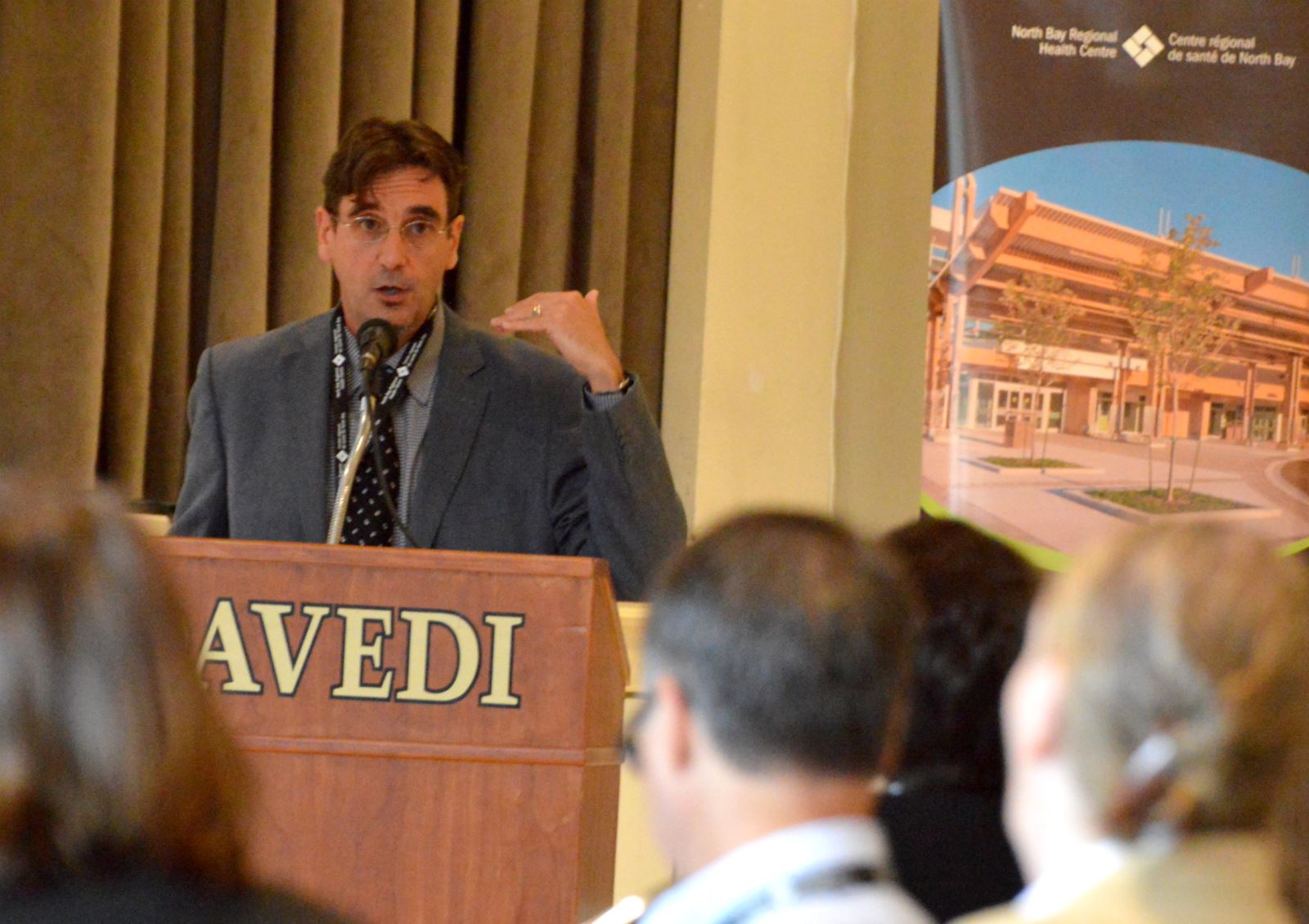 Dr. John Cairney, keynote presenter at the third annual North Bay Regional Health Centre Research Conference, captivated the crowd of health professionals and researchers at the Davedi Club on Friday morning. The day-long conference showcases the leading health research in the region and strives to establish the area as a major contributor to global health research. PHOTO BY LIAM BERTI
Dr. John Cairney, keynote presenter at the third annual North Bay Regional Health Centre Research Conference, captivated the crowd of health professionals and researchers at the Davedi Club on Friday morning. The day-long conference showcases the leading health research in the region and strives to establish the area as a major contributor to global health research. PHOTO BY LIAM BERTI
Even in the world of leading health research and procedures, there’s still plenty of room for advancement.
That’s why some of the most prominent researchers and health professionals in the province gathered at the third annual North Bay Regional Health Centre Research Conference on Friday, further advancing the discussion within the region.
The day-long conference, titled Innovation, Collaboration and Transformation, set out to amalgamate doctors, researchers, clinicians, students and other health professionals in order to expand their understanding and awareness outside of their respective fields of study.
“It’s inspiring and it’s energizing because I don’t think we realize the talent that we have in Ontario and the region,” said Sue Lebeau, director of education, achievement and research for the North Bay Regional Health Centre.
“To see all those minds together, you see links that you wouldn’t otherwise see between the work of one researcher and the work of another.”
Lebeau said that while it may be the third edition of the conference, the profound impact of the researchers sharing their results and projects under the same roof continues to have compounding effects.
As she explained, the formal and informal exchange of expertise continues to spur collaboration and advancement opportunities within the field. Another objective of the conference is to establish Northeastern Ontario as a major contributor to global health research.
“It’s an opportunity to celebrate the research that’s happening in Ontario, to share what we’ve learned with each other and forge new partnerships and create new relationships,” Lebeau explained.
“Research is never done until you disseminate, publish, present and speak to it and let others know so they can apply it to clinical practice or apply it to design new research.”
Keynote presenter Dr. John Cairney had everyone in attendance noticeably engaged during his hour-long presentation on the challenges and opportunities related to early detection of developmental delay in children.
Cairney, professor in the Department of Family Medicine, Psychiatry an Behavioural Neurosciences and Kinesiology at McMaster University, says there are major challenges facing clinicians in accurately providing diagnostic assessments.
“Sometimes they’re coming to school and they’re not ready to learn,” explained Cairney, who is also the director of the Infant and Child Health Lab. “By the time they get to school, some of those problems have already been manifest for a year or more and it’s at a critical development period where we worry that if we don’t do something soon, then that’s going to have long-term negative implications for that child.
“Our systems right now, our healthcare systems and community systems, are not adequate, they don’t have the tools they need to identify those children early and do something about it,” he continued.
Instead, he says, a new toolkit must be established in order for more frequent, intermittent analysis to take place and that there should be a significant amount of importance placed on using a parent screening tool.
“If we just simply look at children when they arrive at school, we’ve missed their history before they’ve arrived there,” Cairney explained. “If we just look at children at an 18-month immunization visit, that's only at one point in time, we don’t have the information that we need, so that’s why the repeated component is so very important.
“Where we’ve failed is we haven’t developed a toolkit or a system that allows us to incorporate that.”
Cairney says he and his team are now in the stages of developing that toolkit and advancing his research from the theoretical to the practical.
“You need to build it working with community partners and people who have direct experience with this, so I really want this not to be an academic exercise; it’s really about building a tool together,” Cairney explained.
The purpose of the conference was exemplified after Cairney’s presentation, as he returned to his table to field a variety of intriguing questions and comments from the various members of the health field.
Researchers from Nipissing University, Timmins and District Hospital, the Children’s Hospital of Eastern Ontario, the Advanced Medical Research Institute of Canada and Laurentian University were all on hand to share their work as well.
In total, the day-long summit featured over 30 oral and poster presentations on a broad range of topics, including the state of Ontario’s child/adolescent inpatient psychiatry services, depression, peer support systems, the prevalence of operational stress injuries in the police force, and smoke exposure and lung cancer, to name just a few.
And now, with a wealth of new knowledge and a broadened perspective in health research, the researchers, clinicians and professionals will set out to find new areas of exploration and analysis with hopes advancing the discussion even further.


